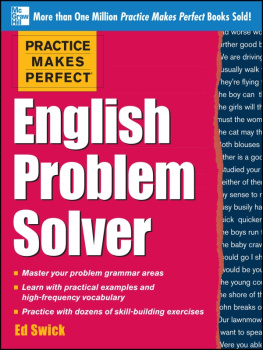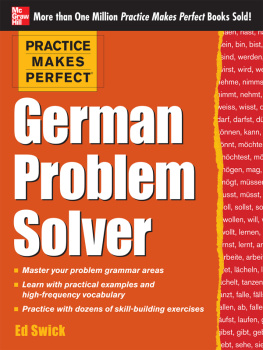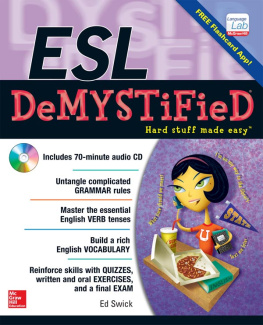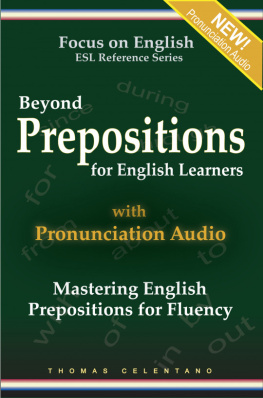Swick - English Pronouns and Prepositions
Here you can read online Swick - English Pronouns and Prepositions full text of the book (entire story) in english for free. Download pdf and epub, get meaning, cover and reviews about this ebook. City: New York, year: 2011, publisher: McGraw-Hill Education, genre: Romance novel. Description of the work, (preface) as well as reviews are available. Best literature library LitArk.com created for fans of good reading and offers a wide selection of genres:
Romance novel
Science fiction
Adventure
Detective
Science
History
Home and family
Prose
Art
Politics
Computer
Non-fiction
Religion
Business
Children
Humor
Choose a favorite category and find really read worthwhile books. Enjoy immersion in the world of imagination, feel the emotions of the characters or learn something new for yourself, make an fascinating discovery.

- Book:English Pronouns and Prepositions
- Author:
- Publisher:McGraw-Hill Education
- Genre:
- Year:2011
- City:New York
- Rating:4 / 5
- Favourites:Add to favourites
- Your mark:
- 80
- 1
- 2
- 3
- 4
- 5
English Pronouns and Prepositions: summary, description and annotation
We offer to read an annotation, description, summary or preface (depends on what the author of the book "English Pronouns and Prepositions" wrote himself). If you haven't found the necessary information about the book — write in the comments, we will try to find it.
English Pronouns and Prepositions — read online for free the complete book (whole text) full work
Below is the text of the book, divided by pages. System saving the place of the last page read, allows you to conveniently read the book "English Pronouns and Prepositions" online for free, without having to search again every time where you left off. Put a bookmark, and you can go to the page where you finished reading at any time.
Font size:
Interval:
Bookmark:
PRACTICE MAKES PERFECT
English Pronouns and Prepositions
English Pronouns and Prepositions

 Copyright 2011 by The McGraw-Hill Companies, Inc. All rights reserved. Except as permitted under the United States Copyright Act of 1976, no part of this publication may be reproduced or distributed in any form or by any means, or stored in a database or retrieval system, without the prior written permission of the publisher. ISBN: 978-0-07-175388-3 MHID: 0-07-175388-5 The material in this eBook also appears in the print version of this title: ISBN: 978-0-07-175387-6, MHID: 0-07-175387-7. All trademarks are trademarks of their respective owners. Rather than put a trademark symbol after every occurrence of a trademarked name, we use names in an editorial fashion only, and to the benefit of the trademark owner, with no intention of infringement of the trademark.
Copyright 2011 by The McGraw-Hill Companies, Inc. All rights reserved. Except as permitted under the United States Copyright Act of 1976, no part of this publication may be reproduced or distributed in any form or by any means, or stored in a database or retrieval system, without the prior written permission of the publisher. ISBN: 978-0-07-175388-3 MHID: 0-07-175388-5 The material in this eBook also appears in the print version of this title: ISBN: 978-0-07-175387-6, MHID: 0-07-175387-7. All trademarks are trademarks of their respective owners. Rather than put a trademark symbol after every occurrence of a trademarked name, we use names in an editorial fashion only, and to the benefit of the trademark owner, with no intention of infringement of the trademark. Where such designations appear in this book, they have been printed with initial caps. McGraw-Hill eBooks are available at special quantity discounts to use as premiums and sales promotions, or for use in corporate training programs. To contact a representative please e-mail us at bulksales@mcgraw-hill.com. Trademarks: McGraw-Hill, the McGraw-Hill Publishing logo, Practice Makes Perfect, and related trade dress are trademarks or registered trademarks of The McGraw-Hill Companies and/or its affiliates in the United States and other countries and may not be used without written permission. All other trademarks are the property of their respective owners. TERMS OF USE This is a copyrighted work and The McGraw-Hill Companies, Inc. (McGraw-Hill) and its licensors reserve all rights in and to the work. (McGraw-Hill) and its licensors reserve all rights in and to the work.
Use of this work is subject to these terms. Except as permitted under the Copyright Act of 1976 and the right to store and retrieve one copy of the work, you may not decompile, disassemble, reverse engineer, reproduce, modify, create derivative works based upon, transmit, distribute, disseminate, sell, publish or sublicense the work or any part of it without McGraw-Hills prior consent. You may use the work for your own noncommercial and personal use; any other use of the work is strictly prohibited. Your right to use the work may be terminated if you fail to comply with these terms. THE WORK IS PROVIDED AS IS. McGRAW-HILL AND ITS LICENSORS MAKE NO GUARANTEES OR WARRANTIES AS TO THE ACCURACY, ADEQUACY OR COMPLETENESS OF OR RESULTS TO BE OBTAINED FROM USING THE WORK, INCLUDING ANY INFORMATION THAT CAN BE ACCESSED THROUGH THE WORK VIA HYPERLINK OR OTHERWISE, AND EXPRESSLY DISCLAIM ANY WARRANTY, EXPRESS OR IMPLIED, INCLUDING BUT NOT LIMITED TO IMPLIED WARRANTIES OF MERCHANTABILITY OR FITNESS FOR A PARTICULAR PURPOSE.
McGraw-Hill and its licensors do not warrant or guarantee that the functions contained in the work will meet your requirements or that its operation will be uninterrupted or error free. Neither McGraw-Hill nor its licensors shall be liable to you or anyone else for any inaccuracy, error or omission, regardless of cause, in the work or for any damages resulting there from. McGraw-Hill has no responsibility for the content of any information accessed through the work. Under no circumstances shall McGraw-Hill and/or its licensors be liable for any indirect, incidental, special, punitive, consequential or similar damages that result from the use of or inability to use the work, even if any of them has been advised of the possibility of such damages. This limitation of liability shall apply to any claim or cause whatsoever whether such claim or cause arises in contract, tort or otherwise.
But the story about pronouns is much longer and more complicated than that. For one thing, there are many types of pronouns. They range from the personal pronouns that everyone identifies with relative ease to possessive pronouns, demonstrative pronouns, relative pronouns, reflexive pronouns, reciprocal pronouns, and others. The list should not frighten you. The names may seem meaningless to you now, but with some experience with the pronouns and adequate practice, they will make sense to you. In this book you will encounter the various types of pronouns.
They will be described for you, and they will be illustrated with examples. Then you will have the opportunity to practice with them in a variety of exercises. The exercises appear in different forms in order to give you practice with the pronouns from different angles. Some of the exercises ask you to select the word that completes a sentence correctly: Jim had an accident with him/his/me/myself new car. Others ask you to complete a sentence with any appropriate pronoun: I hit Tom, and then he hit me back. And still others ask for you to write an original sentence that includes a specific target phrase: Target phrase: one another
They loved one another very much.
The end result will be that you will have developed a better understanding of English pronouns and will have increased your effectiveness in using pronouns.
 The prepositions in that phrase had a lot to do with changing the meaning. There is a rather old-fashioned rule that says that you should never end a sentence with a preposition. In general, its not a bad rule to follow. But there are times when the rule just doesnt work.
The prepositions in that phrase had a lot to do with changing the meaning. There is a rather old-fashioned rule that says that you should never end a sentence with a preposition. In general, its not a bad rule to follow. But there are times when the rule just doesnt work. Winston Churchill, the famed Prime Minister of Great Britain and a highly competent writer and speaker, once joked about the difficulty of conforming to that rule about prepositions when he said: That is nonsense up with which I shall not put. Sometimes a preposition just has to fall at the end of a sentence in order to make sense and not to sound awkward. You will encounter prepositions here in practical forms and in forms that conform to contemporary English. This book will guide you through the maze of prepositional types and uses and clarify their function in a sentence. They will be described and illustrated for you, and then you will have ample opportunity to practice with them in the exercises. And, as with pronouns, there will be numerous kinds of exercises for prepositions.
Take advantage of the contents of this book and increase your ability to use pronouns and prepositions effectively and accurately. This will be an important step in increasing your skill in speaking and writing English. PRACTICE MAKES PERFECT
English Pronouns and Prepositions
PRONOUNS
Font size:
Interval:
Bookmark:
Similar books «English Pronouns and Prepositions»
Look at similar books to English Pronouns and Prepositions. We have selected literature similar in name and meaning in the hope of providing readers with more options to find new, interesting, not yet read works.
Discussion, reviews of the book English Pronouns and Prepositions and just readers' own opinions. Leave your comments, write what you think about the work, its meaning or the main characters. Specify what exactly you liked and what you didn't like, and why you think so.









